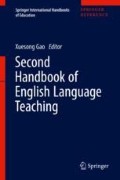Abstract
Responding to increased attention to emotions in English language teaching, this chapter proposes a poststructural-discursive approach that considers the social context and power relations. After discussion of the assumptions of a poststructural-discursive approach, two conceptual tools are introduced: feeling rules and emotion labor. These tools highlight institutional regulation of emotions and teachers’ compliance with or resistance to that regulation.
Feeling rules and emotion labor are illustrated using data gathered from interviews with English language teachers at a US university about the university’s attendance policy, instructors’ own policies, and their reactions to students’ lateness and absence. The data revealed that the attendance policy’s implicit and contradictory feeling rules of vigilance and flexibility generated emotion labor in the teachers, who were tasked with implementing the policy. As to teachers’ responses to lateness and absence, these revealed three emotion-labor discourses: a discourse of teachers’ embodied performance, a discourse of students’ embodied performance, and a discourse of teachers’ emotional in-filling when students were absent. The chapter concludes with implications for pedagogy and English language teacher education to highlight teachers’ emotions and emotion labor from a poststructural-discursive perspective.
Access this chapter
Tax calculation will be finalised at checkout
Purchases are for personal use only
References
Ahmed S (2004) The cultural politics of emotion. Routledge, New York
Appleby R (2013) Desire in translation: white masculinity and TESOL. TESOL Q 47:122–147
Benesch S (2012) Considering emotions in critical English language teaching: theories and praxis. Routledge, New York
Benesch S (2017) Emotions and English language teaching: exploring teachers’ emotion labor. Routledge, New York
Benesch S (2018) Emotions as agency: feeling rules emotion labor, and English language teachers’ decision-making. System. https://doi.org/10.1016/j.system.2018.03.015
Darvin R, Norton B (2015) Identity and a model of investment in applied linguistics. Annu Rev Appl Linguist 35:36–56
Dewaele J-M et al (2016) Do girls have all the fun? Anxiety and enjoyment in the foreign language classroom. Theory Pract Second Lang Acquis 2:41–63
Dörneyei Z, Kubanyiova M (2014) Motivating learners, motivating teachers: building visions in the language classroom. Cambridge University Press, Cambridge, UK
Gabrys-Barker D, Bielska J (eds) (2012) The affective dimension in second language acquisition. Multilingual Matters, Bristol
Gkonou C, Miller ER (2017) Caring and emotional labour: language teachers’ engagement with anxious learners in private language school classrooms. Lang Teach Res. https://doi.org/10.1177/1362168817728739. (Early Online)
Harding J, Pribram ED (Eds) (2009) Emotions: A Cultural Studies Reader. London: Routledge
Hochschild AR (1979) Emotion work, feeling rules, and social structure. Am J Sociol 85:551–575
Hochschild AR (1983) The managed heart: commercialization of human feeling. University of California Press, Berkeley
Johnson KE, Golombek PR (2002) Inquiry into experience: teachers’ personal and professional growth. In: Johnson KE, Golombek PR (eds) Teachers’ narrative inquiry as professional development. Cambridge University Press, Cambridge, UK, pp 1–11
Krashen SD (1982) Principles and practice in second language acquisition. Pergamon, Oxford
Loh CE, Liew WM (2016) Voices from the ground: the emotional labour of English teachers’ work. Teach Teach Educ 55:267–278
Mahmoodzadeh M, Gkonou C (2015) A complex dynamic systems perspective on foreign language anxiety. Konin Lang Stud J 3:89–108
Miller ER, Gkonou C (2018) Language teacher agency, emotion labor and emotional rewards in tertiary-level English language programs. System. https://doi.org/10.1016/j.system.2018.03.002
Motha S, Lin A (2013) “Non-coercive rearrangement”: theorizing desire in TESOL. TESOL Q 48:331–359
Norton B (2000) Identity and language learning: gender, ethnicity and educational change. Pearson Educational, Harlow
Parr H, Fyfe N (2012) Missing geographies. Prog Hum Geogr 37:615–638
Pavlenko A (2012) Affective processing in bilingual speakers: disembodied cognition? Int J Psychol 47:405–428
Prior MT (2015) Emotion and discourse in L2 narrative research. Multilingual Matters, Bristol
Şimşek E, Dörnyei Z (2017) Anxiety and L2 self-images: the ‘anxious self’. In: Gkonou C, Daubney M, Dewaele J-M (eds) New insights into language anxiety: theory, research and educational implications. Multilingual Matters, Bristol, pp 51–69
Takahashi K (2013) Language learning, gender and desire: Japanese women on the move. Multilingual Matters, Bristol
Tracy SJ, Trethewey A (2005) Fracturing the real self ↔ fake self dichotomy: moving toward “crystallized” organizational discourses and identities. Commun Theory 15:168–195
Verity DP (2000) Side effects: the strategic developments of professional satisfaction. In: Lantolf JP (ed) Sociocultural theory and second language learning. Oxford University Press, Oxford, pp 179–197
Warriner DS (2013) ‘It’s better life here than there’: elasticity and ambivalence in narratives of personal experience. Int Multiling Res J 7:15–32
Waterhouse M (2012) ‘We don’t believe media anymore’: mapping critical literacies in an adult immigrant language classroom. Discourse Stud Cult Polit Educ 33:129–146
Zembylas M (2005) Teaching with emotion: a postmodern enactment. Information Age Publishing, Greenwich
Author information
Authors and Affiliations
Corresponding author
Editor information
Editors and Affiliations
Rights and permissions
Copyright information
© 2019 Springer Nature Switzerland AG
About this entry
Cite this entry
Benesch, S. (2019). Feeling Rules and Emotion Labor: A Poststructural-Discursive Approach to English Language Teachers’ Emotions. In: Gao, X. (eds) Second Handbook of English Language Teaching. Springer International Handbooks of Education. Springer, Cham. https://doi.org/10.1007/978-3-030-02899-2_57
Download citation
DOI: https://doi.org/10.1007/978-3-030-02899-2_57
Published:
Publisher Name: Springer, Cham
Print ISBN: 978-3-030-02897-8
Online ISBN: 978-3-030-02899-2
eBook Packages: EducationReference Module Humanities and Social SciencesReference Module Education

